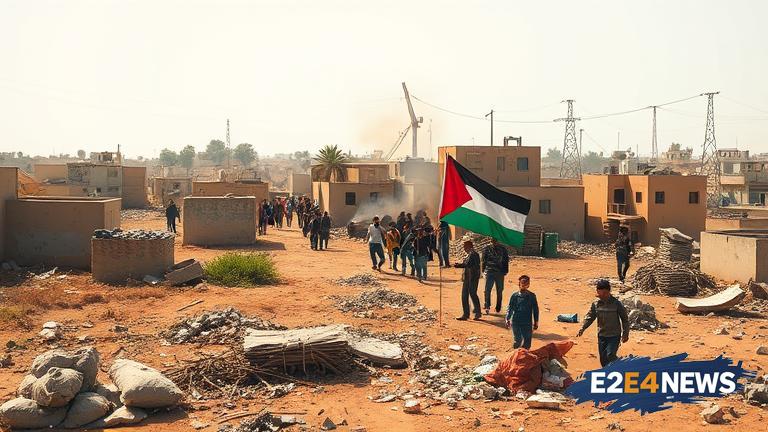The Gaza Strip, a Palestinian territory, is facing a severe humanitarian crisis, with mass starvation looming as a major concern. The crisis has been exacerbated by a prolonged blockade, which has restricted the flow of essential goods, including food and medicine. The situation has been further complicated by the COVID-19 pandemic, which has put a strain on the already fragile healthcare system. Thousands of civilians are struggling to access basic necessities, including food, water, and shelter. The crisis has been described as a ‘ticking time bomb’ by humanitarian organizations, with warnings of a potential catastrophe if urgent action is not taken. The Gaza Strip has been under a blockade since 2007, which has had a devastating impact on the local economy and infrastructure. The blockade has restricted the movement of people and goods, making it difficult for aid to reach those in need. The situation has been further complicated by the destruction of infrastructure, including homes, schools, and hospitals, during periods of conflict. The humanitarian crisis in Gaza has been described as one of the worst in the world, with severe shortages of food, water, and medicine. The crisis has had a disproportionate impact on vulnerable populations, including children, women, and the elderly. Humanitarian organizations have warned of a potential outbreak of water-borne diseases, due to the lack of access to clean water and sanitation facilities. The crisis has also had a significant impact on the mental health of civilians, with high levels of anxiety, depression, and post-traumatic stress disorder (PTSD). The international community has been criticized for its response to the crisis, with many arguing that more needs to be done to address the root causes of the crisis. The United Nations has warned of a potential humanitarian catastrophe, with predictions of a significant increase in poverty, hunger, and disease. The crisis has also had a significant impact on the environment, with the destruction of natural habitats and the pollution of water sources. The Gaza Strip is one of the most densely populated places in the world, with a population of over 2 million people living in a area of just 360 square kilometers. The crisis has been described as a ‘man-made disaster’ by humanitarian organizations, with warnings that the situation will only continue to deteriorate unless urgent action is taken. The international community has been called upon to take immediate action to address the crisis, including the provision of emergency aid and the lifting of the blockade. The crisis has also highlighted the need for a long-term solution to the conflict, including a negotiated settlement that addresses the root causes of the crisis. The situation in Gaza is a stark reminder of the devastating impact of conflict and humanitarian crises on civilians, and the need for urgent action to protect human life and dignity. The crisis has also highlighted the importance of international cooperation and solidarity in responding to humanitarian crises, and the need for a coordinated and sustained response to address the root causes of the crisis. The Gaza Strip is a territory with a rich history and culture, with a population that is resilient and determined to survive despite the odds. However, the crisis has had a significant impact on the social and economic fabric of the territory, with many families struggling to survive. The crisis has also had a significant impact on the education and healthcare systems, with many schools and hospitals closed or damaged. The situation in Gaza is a complex and multifaceted one, with many different factors contributing to the crisis. However, one thing is clear: urgent action is needed to address the crisis and prevent a humanitarian catastrophe. The international community has a responsibility to act, and to take immediate action to address the root causes of the crisis. The people of Gaza deserve our support and solidarity, and it is our responsibility to ensure that they receive the aid and assistance they need to survive.





